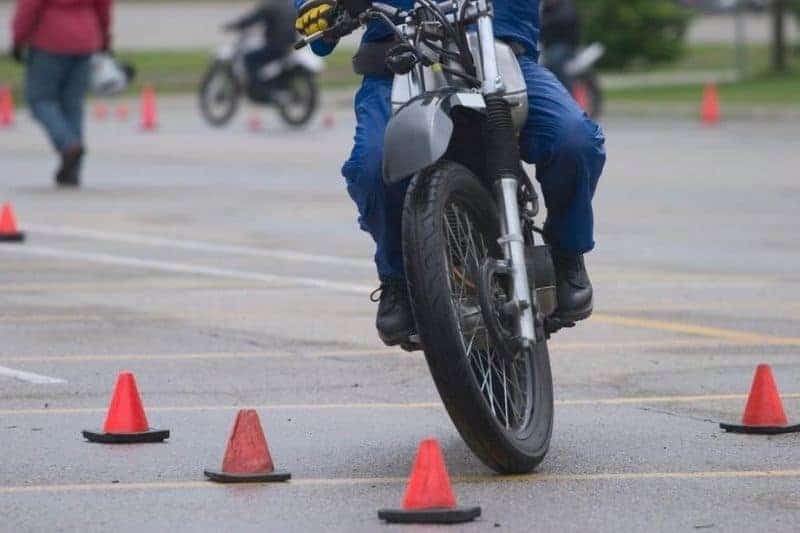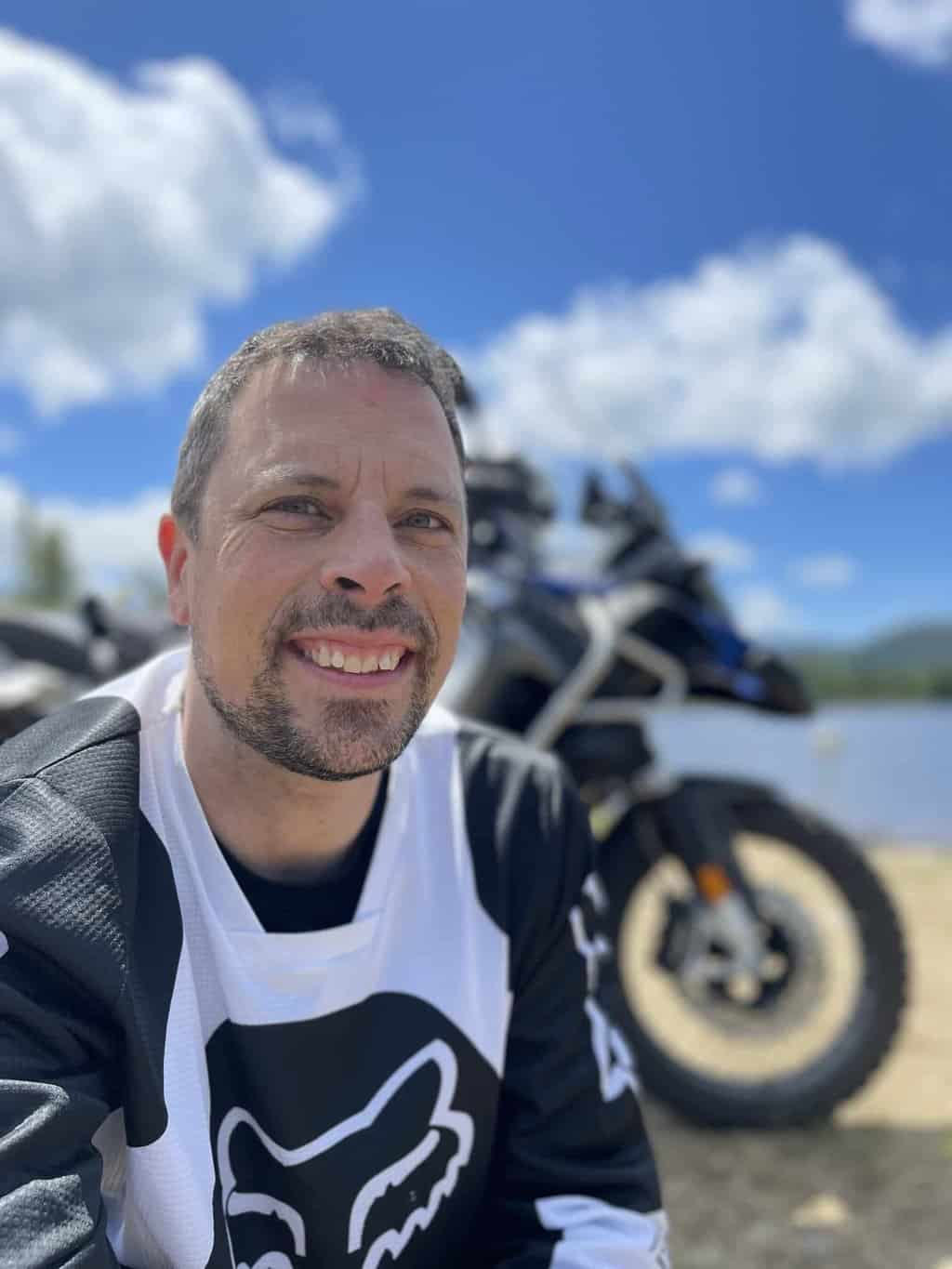Maybe you have just registered for a local MSF course, or maybe you are still contemplating the idea.
However, you may be unsure what the MSF course is like, whether it is easy and what to expect.
Passing the MSF course is absolutely worth it, and many riders share that they continue to reflect back on what they have learned almost all the time.
During the MSF course, students can expect to learn about the basics of riding, which include low-speed maneuvers, clutch and throttle control, braking and swerving, stopping and avoidance techniques, looking through turns, friction zone, and more.
The classes take place in a safe environment, off the streets. Normally several different motorcycles are offered in the 125cc to 250cc range. The classes are fairly small, typically between 8 to 16 people. Usually, there will be a mix of complete beginners who have never been on a motorcycle before and returning riders.
Table of Contents

Is the MSF course hard to pass
Most beginner riders find MSF courses to be fairly easy to pass. The failure rates are very low, and the majority of students pass the MSF courses easily. The reason why MSF courses are not too difficult is that they are intended to teach beginners only the basics of riding a motorcycle.
Students are taught what to do, not to do, and how to ride safely. Some of the things that students will go over are, but not limited to:
- Using the friction zone
- Starting and stopping
- Shifting and stopping
- Stopping in a curve
- Lane changes and curve understanding
- Low-speed maneuvers
- Cornering and leaning
- Maneuvering in tight spaces
- Quick stopping
- Crossing obstacles and swerving
Often instructors will say that you do not need any special knowledge or skills in order to apply for an MSF course. However, you will also often hear that being able to ride a bicycle and operate a manual shift car transmission will help greatly in learning how to ride a motorcycle. That being said, riding a bicycle can sometimes be required. (See: Can you ride a motorcycle if you cannot ride a bicycle?)
Here’s the thing
MSF beginner rider courses are geared toward complete beginners (although there are also advanced rider courses). As such, they have been designed to meet the needs of beginners and allow them to ride on public roads safely.
MSF courses are designed to teach you the absolute basics of riding a motorcycle and not more than that. This is why instructors often say that the basic riders MSF course is just the first step, and it is recommended to enroll in further courses about advanced riding techniques.
Riding a motorcycle is a learning process that never ends, even after years of riding and thousands of miles behind your back. (See: How long does it take to get good at riding a motorcycle?)
MSF courses are very informative and teach the necessary skills and knowledge to safely ride on public roads. However, for beginners, the information thrown at them can sometimes be too much, and things can be a little overwhelming.

Is the MSF written test easy?
The MSF written test is considered very easy by most students. There are very few students who do not pass the written test. Usually, the questions are somewhat obvious, but there can be a few tricky and more difficult questions here and there.
Often everything needed to pass the written test has been gone over several times during classroom classes at the start of the MSF. The questions are fairly straightforward, and all that is required is to take notes during the lessons when necessary and pay attention.
In addition, people who are worried about passing the written test can look up online MSF practice tests.
The MSF written test usually consists of 15 to 25 multiple-choice questions. The number of questions on MSF courses can vary between states.

Is the MSF skills and riding test difficult?
The MSF skills test can be difficult for new riders. Beginners find the U-turn box (the figure 8s) and the emergency stops more difficult because it is easier to stall or drop the bike. The cone weave and obstacle swerve are usually not too difficult for most students.
The MSF skills test consists of cone weave, normal and quick stops, turning from a stop, and U-turn.
Students will normally get at least several tries on each exercise. And at the end of the course, they will be tested.
Point deductions for mistakes are fairly generous, although dropping the motorcycle will result in an immediate failure.
Asking questions is very much recommended and encouraged. You have paid for the course, and MSF courses can be expensive sometimes, so make sure you get the most out of it. Remember, there are no stupid questions, and your questions may also help other riders.
Another thing worth keeping in mind is the weather. The riding part of the MSF course will be held in sunny, rainy, or windy weather. Each type of weather brings a different set of difficulties that should be considered.
Another detail worth mentioning is that students should come prepared for the skills test of the MSF course. The riding part usually lasts several hours, and people can get exhausted by the end of it. (Especially during the summer when the heat can become very uncomfortable.)
A word on instructors.
Instructors are there to help the students not fail. However, not all instructors will be the same.
An instructor that is patient, helpful, understanding, and friendly can help a great deal in making the students feel more confident, relaxed, and comfortable learning and mastering their ride.
On the other hand, an instructor that is impatient, rude, and constantly yelling can turn the whole course into a nightmare. Students will be under more pressure and feel a lot more stressed than they should. Dealing with this kind of instructors can lead to more mistakes and higher failure rates.
Also, the MSF courses at Harley can be a little more difficult due to the larger motorcycles used. Smaller riders may find them difficult to control and maneuver compared to the smaller motorcycles used in most other MSF courses. (See: Is it harder to ride a heavy motorcycle?)
There is also usually a lot of marketing and time spent on selling you a Harley, which some people dislike. That being said, passing the basic riders course at your local Harley store is also often coupled with good discounts.

Can you fail the MSF course?
It is possible to fail the MSF course. However, this happens very rarely. Most MSF classes consist of 8 to 16 people, of which the vast majority pass, and occasionally 1 to 3 students will fail.
Many people fail the MSF course due to anxiety and nervousness during the riding test.
Although there will be a mix between new riders and returning riders, there can be instances where the majority of students will be returning riders, with only a few people actually being new riders. This can put some extra pressure on the new riders due to fear of embarrassment.
As a matter of fact, even experienced riders can fail the MSF course if they get too nervous during the test. This is why the state of mind is extremely important to all riders.
It is not necessarily bad news if you have failed the MSF course.
The reality is not everyone learns at the same pace. Some people are quicker to grasp the matters at hand, while others will feel less confident and a lot more nervous, and as a result, more likely to fail the MSF test.
Failing the MSF course can be a very frustrating and embarrassing experience, however, this does not mean you are not capable of riding a motorcycle, or you should give up on motorcycles. If you are still willing to pursue riding, you can retake the MSF course. Many places offer significant discounts and individual lessons at an additional fee.
On top of that, MSF courses are fairly short, usually lasting between 2 to 3 days in total, and this is not going to be enough time for all people to get comfortable, relax, and get confident in their riding abilities. For a beginner, it can be a lot to learn in just a few days, so failing the MSF course is not something to worry too much about.
Practice is key. It is recommended during the second try to ask plenty of questions and make sure to get the most out of the course.
Before taking the MSF course and during the course, it is recommended to supplement your learning and not rely on the course alone.
Read books on motorcycling (like Proficient Motorcycling, which is an excellent book and one of the best books for beginners. See: The best motorcycle books for beginners) and check online resources of information such as videos on riding motorcycles and look for information on authoritative websites about motorcycling, where you might find answers to some of the most common questions riders have.

Meet Simon, the 46-year-old aficionado behind YourMotoBro. With a lifelong passion ignited by motocross dreams and a Canadian Tire bicycle, Simon’s journey has been nothing short of extraordinary. From coaching underwater hockey to mastering muddy terrains, he’s an authority in thrill and adventure. Certified as an Off-Road Vehicle Excursion Guide and trained in Wilderness First Aid, Simon’s love for bikes is as diverse as his collection—from a robust BMW GSA R1200 to the memories of a Harley Davidson Night Train. By day a respected telephony consultant, by night a motorcycle maestro, Simon’s tales are a blend of expertise, resilience, and undying passion. ?️✨
